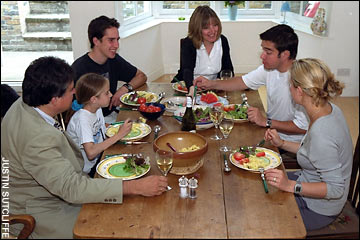
Main point: Church is a place to be deliberately family-focussed and outsider friendly, at the same time.
Church is a family. Jesus Himself said “My mother and brothers are those who hear God’s word and put it into practice” (Luke 8 v 21).
But it’s an open family. Anyone can join, by receiving Jesus as Lord (John 1 v 12-13). And it’s a welcoming family. At the family get-togethers, what the family does is meant to attract outsiders (1 Corinthians 14 v 23-25).
Imagine the scene. It’s a suburban house, and the family are sitting down to their meal. Nothing special in that; but tonight is different. Johnny, the son, has brought his girlfriend, Sarah, round. It’s the first time his parents have met her—and the first time she’s met them.
How will the presence of Sarah make a difference? Well, in one sense, she won’t. The family is still the family, and she’s not part of it (yet—Johnny’s hopeful, though!). They still sit down at their dining table for food, at the normal time, in their normal places, eating food they like.
But in another sense, things are very different. Mum checked what food Sarah liked beforehand. Everyone introduced themselves to her. Dad made sure Sarah was included in the conversation. Her opinion was asked for and listened to.
Is this a helpful way to think about how our church gatherings should be? It’s a family occasion—with non-family members there. The family need feeding, but that never needs to be at the expense of being welcoming and accessible to non-Christians, listening to them and being relevant for them.
This isn’t an “either-or” (either church is for Christians, apart from the odd evangelistic service, or it’s a seeker service, for non-Christians, with nothing for mature believers). It’s a both-and (both for Christians and for newcomers).
I wonder if the way to tell if a church is both-and is this: Would church members confidently bring a non-Christian friend on any Sunday, and know that they’ll be welcomed, feel listened to, and hear the gospel relevantly?
What might help the answer to that question be “yes”? A few suggestions:
If Sarah chooses not to become part of the family, we want that to be because she decides she doesn’t love Johnny, not because his family put her off before she had a chance to work out how she felt about him! If a newcomer decides not to become part of our church family, let that be because they decide they don’t love the Lord Jesus—not because Jesus’ family put them off before they had the chance to work it out!
Practical suggestion: At your next Sunday service, try to put yourself in the shoes of someone who’s never been to church before. What would help you understand what was going on, feel included, and not awkward? What would help you feel valued and worthwhile, and as if you matter?